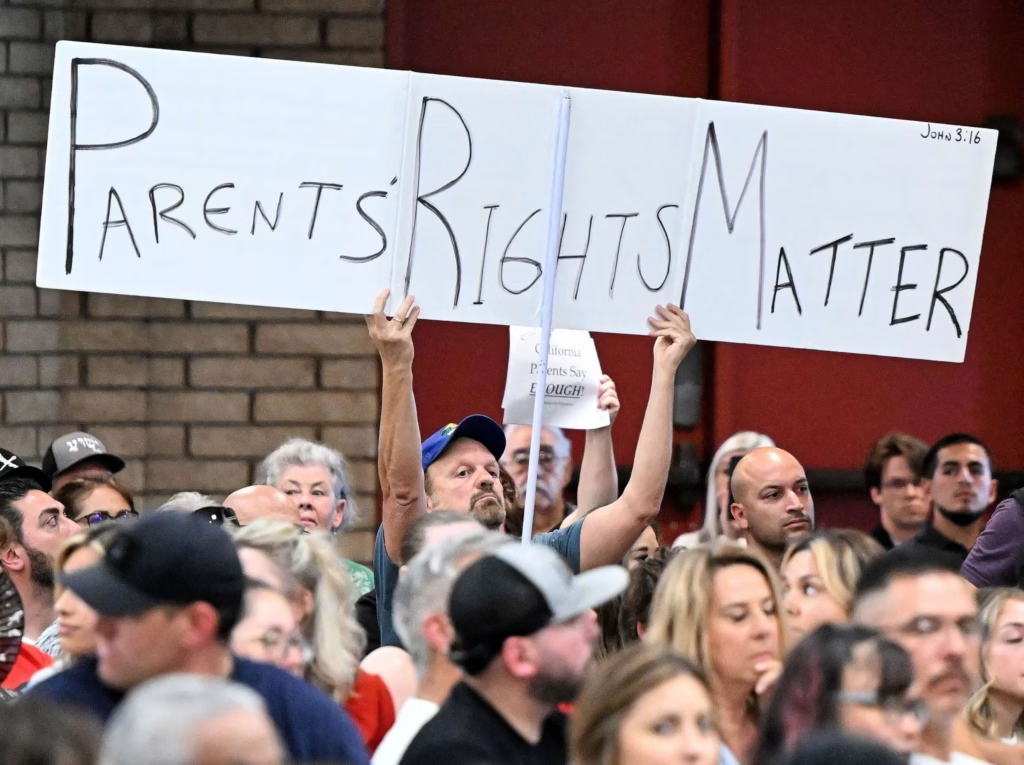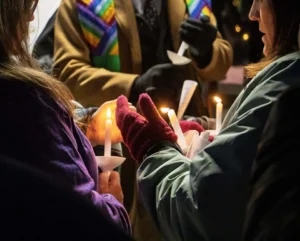Parental Rights in Education: The Intersection of Religion and Curriculum

Parental Rights in Education: The Intersection of Religion and Curriculum
Introduction
In the ever-evolving landscape of education, parental rights have emerged as a critical component of the dialogue surrounding curriculum choices and religious beliefs. A recent poll indicates that a substantial majority of Americans, spanning diverse religious affiliations, advocate for the prerogative of parents to opt their children out of instruction that contradicts their personal convictions. This sentiment underscores a growing recognition of the integral role that family values and religious perspectives play in the educational experience.
As education systems increasingly incorporate a wide range of perspectives—including those related to social issues, historical interpretations, and moral frameworks—parents find themselves navigating a complex web of content that may not align with their deeply held beliefs. The polling data highlights a clear call for greater autonomy for parents within educational settings, emphasizing their right to determine the appropriate boundaries of instruction for their children. This right to withdraw children from certain classes is often viewed as essential for preserving family integrity and respecting individual religious convictions.
The implications of these findings are particularly significant as they challenge educational institutions to balance curriculum advancements with respect for parental authority. Schools must consider the diverse viewpoints of families while striving to deliver an inclusive educational experience that prepares students for a multifaceted society. As this issue continues to unfold, the intersection of religion and education will likely remain a focal point, prompting further discussions on the extent of parental rights in shaping educational pathways for their children.
Understanding the Poll Results
The recent poll findings reveal a significant trend towards support for parental rights in education, particularly concerning the intersection of religion and curriculum. According to the data collected, approximately 70% of Americans endorse the idea that parents should have a decisive voice in the educational content delivered to their children. This overwhelming support transcends traditional political lines, reflecting diverse demographic backgrounds and beliefs.
When examining the demographic breakdown, notable distinctions emerge between various religious and non-religious groups. Among respondents who identify as practicing Christians, support for parental rights in education reaches upwards of 85%. This figure underscores the importance these groups place on aligning educational content with their religious beliefs. Conversely, among non-religious respondents, approximately 55% express support for parental rights, albeit at a significantly lower percentage. This divergence highlights varied perspectives influenced by religious beliefs and values when it comes to educational methodologies and content.
Additionally, the poll indicates that parents with school-aged children are particularly interested in maintaining oversight of their children’s education, with 80% affirming the necessity of parental involvement in educational decisions. This sentiment is echoed across different ethnic backgrounds, suggesting a shared concern for the values instilled in educational settings amidst an increasingly pluralistic society.
In the context of educational policies, these poll results carry substantial implications. As policymakers contemplate reforms, the clear majority opinion on parental rights could serve as a catalyst for legislative changes that prioritize family input in education. The demonstrated support from both religious and non-religious constituents reinforces the understanding that parental involvement is not only desired but necessary for educational frameworks that reflect diverse values and beliefs.
Religious Beliefs and Educational Content
In the realm of public education, the curriculum often encompasses a wide range of topics that may conflict with the personal religious beliefs of some parents. One prominent area of concern is sex education, where discussions surrounding human sexuality, methods of contraception, and sexual orientation can clash with conservative religious teachings. Many parents advocate for abstinence-only education, opposing comprehensive sex education that includes discussions of LGBTQ+ identities and practices. This divergence between educational objectives and parental expectations raises significant questions about the role of religion in determining appropriate content.
Furthermore, the teaching of evolution remains a contentious issue, particularly among religious groups who favor creationism or intelligent design as alternatives to Darwinian evolution. This debate often fuels heated arguments over the rightful place of religious perspectives in the science curriculum, challenging educators to balance scientific accuracy with respect for diverse belief systems. It is paramount to navigate these discussions thoughtfully, as they highlight the tension between secular educational standards and religious convictions.
Subjects addressing LGBTQ+ issues are increasingly integrated into educational programs, presenting another complex intersection of religion and curriculum. For parents who hold traditional views regarding gender and sexuality, these topics may seem contrary to their religious convictions. The shift towards inclusivity and representation led by schools aims to foster understanding, yet this may spark resistance from families concerned about their children being exposed to ideologies that contradict their faith.
Above all, the intersection of religion and educational content illustrates the broad spectrum of moral and ethical views held by families. As public schools strive to create curricula that cater to diverse populations, it is crucial for these institutions to remain cognizant of the varying perspectives that exist within their communities, ultimately promoting a dialogue that respects both educational goals and parental rights.
Legal Framework for Parental Rights
Parental rights in education are grounded in both statutory and case law, highlighting the significant role that legal frameworks play in shaping the educational experience of children, particularly as it pertains to their religious beliefs and values. The United States Constitution, particularly the First Amendment, provides a foundation for parents’ rights to direct the upbringing and education of their children, including religious instruction. This amendment guards against government interference with the free exercise of religion, allowing parents to impart their religious beliefs to their children. Moreover, the Fourteenth Amendment’s Due Process Clause reinforces parental rights by affirming that parents have a fundamental right to make decisions regarding the care, custody, and control of their children.
Various state laws further clarify and protect these rights, often permitting parents to opt their children out of specific classes or curricular elements that conflict with their religious convictions. For instance, many states have provisions that allow parents to withdraw their children from sex education or health classes that do not align with their family’s religious beliefs. Additionally, landmark court cases, such as Pierce v. Society of Sisters (1925), established that parents have the constitutionally protected right to choose nonpublic education for their children, a decision typically rooted in their religious values.
Nevertheless, these parental rights are not absolute. Courts have often ruled that schools have a duty to deliver a comprehensive educational experience, which may include teaching content that some parents might find objectionable. This balancing act between parental rights and educational mandates presents challenges, particularly in cases where state policies may dictate curriculum without accommodating diverse religious perspectives. Understanding the legal nuances and limitations of parental rights in education is essential for navigating this complex intersection of law, religion, and curriculum.
The Role of Educational Institutions
Educational institutions play a crucial role in navigating the complex landscape of parental rights in relation to curriculum content. As society becomes increasingly diverse, schools grapple with the challenge of accommodating various religious beliefs while also adhering to secular educational mandates. In response to parental concerns, many schools have established formal policies that allow for the inclusion of diverse perspectives, ensuring that religious beliefs are respected without compromising the educational integrity of the curriculum.
One common strategy employed by educational institutions is the implementation of open communication channels between schools and parents. This encourages a collaborative approach, allowing parents to express their concerns and preferences regarding the curriculum. Schools often hold meetings, workshops, or forums, enabling parents to engage with educators and administrators. Such initiatives foster transparency and build trust, as they provide a platform for dialogue about content that may intersect with religious convictions.
Additionally, schools strive to cultivate an inclusive environment that respects diverse beliefs while maintaining a balanced educational framework. This may involve integrating religious perspectives in a manner that is relevant to secular subjects while being sensitive to the beliefs of different families. Educational institutions often seek expert guidance when developing curricula, aiming to reflect diversity without presenting any single viewpoint as the definitive narrative. Such efforts are essential to maintain a respectful atmosphere where all students, regardless of their backgrounds, feel valued and understood.
Ultimately, the role of educational institutions is to ensure that they address parental concerns in a manner that upholds educational standards and fosters an inclusive community. By balancing these considerations, schools can create an environment where both academic integrity and respect for individual beliefs coexist harmoniously, facilitating a constructive dialogue between parents and educational authorities.
Impact on Student Learning and Socialization
The dynamics of parental rights in education, particularly concerning the exclusion of students from specific classes due to conflicting religious beliefs, present a complex landscape with significant implications for student learning and socialization. Allowing parents to withdraw their children from certain curriculum components may foster an environment of comfort for those students, aligning their educational experiences with their familial values. However, the long-term effects of such practices on educational outcomes warrant thorough consideration.
When students are withdrawn from classes that address issues related to diverse beliefs, they may miss out on enriched educational experiences that promote critical thinking, tolerance, and understanding of various cultures and viewpoints. Exposure to differing ideologies broadens perspectives and aids in developing a well-rounded educational background. Consequently, students who are sheltered from these topics might struggle to engage in meaningful dialogue and encounter difficulties navigating a diverse society upon entering adulthood.
Moreover, socialization is a fundamental aspect of development during formative years. Isolating students from peers who represent differing beliefs could cultivate an environment of insularity, hindering their ability to relate to others and participate in collaborative learning experiences. Such isolation may generate a sense of “us versus them,” further polarizing students based on their upbringing rather than promoting a sense of community and mutual respect. These interactions are essential in cultivating social cohesion and fostering a secure environment in which students learn to appreciate diversity.
Furthermore, the potential societal outcomes should be an ongoing concern. Education serves not only as a means for personal growth but also as a foundation for a cohesive society. Ensuring that all students engage with a comprehensive curriculum may ultimately lay the groundwork for a more inclusive community, where shared experiences can bridge the gaps between differing beliefs and values. Addressing these issues will be vital as educators and policymakers navigate the delicate balance between parental rights and educational integrity.
Case Studies and Real-Life Instances
The intersection of parental rights in education and religious beliefs often leads to real-life scenarios where parents exercise their rights to withdraw their children from specific classes. One notable example involves a family in Texas who objected to the teaching of evolution in their child’s biology class. Citing deep religious convictions, they requested that their child be exempted from the curriculum that focused on the scientific explanation of origins. As a result, the school district accommodated their request by providing alternative assignments and ensuring the student was not present during discussions related to evolution. This case illustrates the balance schools often strive for between educational integrity and parental rights.
Another instance comes from California, where a group of parents challenged a sex education curriculum that included discussions on LGBTQ+ issues. The parents argued that the content conflicted with their religious beliefs. They exercised their rights under state law, which allows parents to opt-out their children from specific sections of health education. The school district responded by informing the parents about their legal options and ultimately provided alternatives for students who were withdrawn from such lessons, highlighting the adaptability of educational institutions to address parental concerns while fulfilling legal obligations.
In a more contentious case, a family in Florida confronted their local school board over the inclusion of a multicultural curriculum, which the parents felt undermined their religious teachings. The board faced significant pushback, and the case garnered media coverage, prompting discussions about the role of religion in public education. Although the board did not change the curriculum, they committed to hosting discussions with community members to address concerns, exemplifying how such instances can lead to broader dialogues about the intersection of faith and education. These cases emphasize that while parental rights in education allow for religious objections, the resulting actions and responses vary greatly, affecting the educational landscape and community dynamics.
Public Opinion and Future Trends
Recent surveys and focus groups indicate a significant shift in public opinion regarding parental rights in education, particularly related to the integration of religious beliefs and specific curricular content. Many parents express concerns regarding how educational material aligns with their values, leading to increased demands for greater involvement in school governance. This trend suggests a growing awareness and assertiveness among parents regarding their rights, particularly pertaining to content that may conflict with their religious beliefs or cultural values.
Historically, education systems have often prioritized a standardized curriculum that may not fully consider the diverse backgrounds of all students. However, as societal norms evolve, particularly with increasing cultural pluralism, education authorities face pressure to adapt their curricula. This evolution may lead to a heightened emphasis on inclusivity and sensitivity to various belief systems. As public opinion increasingly supports parental involvement, schools may need to create policies that facilitate dialogue between educators and families, allowing for the customization of portions of the curriculum.
Future educational policies may reflect this shift by incorporating more parental feedback mechanisms, enabling families to have a voice in curricular decisions. Furthermore, as educational environments become more aware of the diverse beliefs held by students and their families, the likelihood of tailored educational programs increases. Such adaptations could lead to a ripple effect where schools not only address parental concerns but also enrich the educational experience by promoting understanding and respect for different perspectives.
Overall, the combination of heightened awareness among parents and evolving societal values indicates that discussions surrounding parental rights in education will continue to gain traction. It remains essential for educational institutions to navigate these changes thoughtfully, balancing both parental interests and the overarching goal of providing a comprehensive education that prepares students for a diverse world.
Conclusion
In reflecting on the complex interplay between parental rights in education and the influence of religion on curriculum, it becomes evident that these issues are both significant and multifaceted. The findings of recent polls underscore the divergence of opinions among parents regarding the role of religion in educational settings. Many respondents advocate for a curriculum that respects their religious beliefs while ensuring that all students receive a well-rounded and objective education.
The polls reveal a strong desire among parents for their rights to be upheld in educational environments. This sentiment is indicative of a broader societal shift, where individuals seek to assert their values in defining what is taught in schools. The challenge lies in striking a balance between accommodating these religious beliefs and maintaining an inclusive and comprehensive curriculum that serves the diverse population of students. Clearly, educational institutions are at a crossroads where they must navigate parental expectations alongside educational standards and the diversity of student backgrounds.
As discussions about parental rights and educational content continue to evolve, it is paramount for policymakers, educators, and parents to engage in constructive dialogue. This conversation should focus on how best to respect individual beliefs while promoting an educational experience that prepares students for a pluralistic society. As communities grapple with these issues, it will be crucial for all stakeholders to remain informed and open to dialogue regarding the implications of their choices on the educational landscape. Ultimately, the future of parental rights in education may hinge on how effectively these discussions translate into policies that honor both religious convictions and the educational needs of all students.








Leave a Reply
You must be logged in to post a comment.